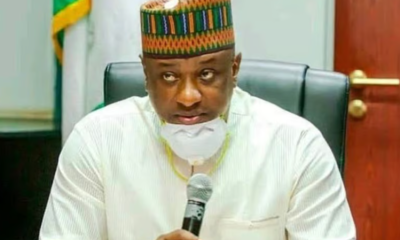Featured
Buhari in another diplomatic flaw, unfolds plans at UNGA to reverse climate change in Nigeria
Published
5 years agoon
By
Olu Emmanuel
President Muhammadu Buhari may be making another diplomatic flaw at the 74th United Nations General Assembly (UNGA74) in his participation in multilateral international relations institutions. The President appears to have sustained seeming ego and leadership perfection postures while participating in multilateral diplomatic platforms from the United Nations (UN) to the African Union (AU) and others, where global leaders go to seek technical and financial assistance to solve social, environmental, political, economic and other development problems in their countries.
At the end, the Nigerian President returns with little or nothing that will benefit the country.
Again, President Buhari on Monday at the United Nations General Assembly (UNGA74) in New York, United States (US), rather than present the challenges of climate change in Nigeria and areas where the federal government would need assistance, announced robust plans and initiatives by his administration to reverse the negative effects of climate change in Nigeria.
President Buhari in his address to the United Nations Climate Action Summit with the theme, “A Race We Can Win. A Race We Must Win,” was of the view that climate change is a human-induced phenomenon; he, however, acknowledged the concerns of the UN Secretary General that the world is on the verge of climate change catastrophe.
President Buhari’s full speech reads:
I share the sentiment expressed by the Secretary-General that the world is on the verge of climate catastrophe. Undeniably, Climate Change is a human-induced phenomenon.
It is now imperative that we must step-up our collective climate actions in line with the request of the Secretary General. It is in this regard that I wish to reiterate Nigeria’s commitment to its obligation under the Paris Agreement, the aspirations enshrined in our Nationally Determined Contribution (NDC) and ensure a resilient future that mainstreams climate risks in our decision making.
I want to announce that the Government of Nigeria will develop a more robust sectorial action plan, and expand the scope of our Sovereign Green Bonds in line with our intended upward review of Nigeria’s NDC’s towards the inclusion of the water and waste sectors by 2020.
In the water sector, Nigeria will issue a Green Bond for irrigation and construct multi-purpose dams for power, irrigation and water supply. We will strengthen solid and liquid waste management systems to attract more private sector investors.
We will take concrete steps to harness climate innovative ideas by including youths in decision making processes as part of our over-all climate governance architecture. We will mobilize Nigerian youths towards planting 25 million trees to enhance Nigeria’s carbon sink.
In the energy sector, Nigeria is presently diversifying its energy sources from dependence on gas-powered system to hydro, solar, wind, biomass and nuclear sources. Specifically, Nigeria is progressively working to realize 30 percent energy efficiency and renewable energy mix by 2030. This is envisaged to lead to 179 million tons of carbon dioxide reduction per annum by 2030.
In addition, our Administration intends to develop a shelter belt across 11 States of the Federation spanning a distance of 1,500 km and 15km across through the Great Green Wall initiative. Furthermore, the Federal Government has commenced the implementation of the Hydrocarbon Pollution Remediation Programme in Ogoniland, to recover the carbon sink potential of the mangrove ecosystem of the one thousand square kilometers (1,000 KM2) polluted site in the affected area.
I should also inform the summit that our Government has introduced Climate Smart Agricultural Practices to unlock Seventy-Four (74) Million tons of carbon dioxide per annum, through relevant technologies, advocacy and best practices.
As you are aware, the Lake Chad Basin, which used to be a region of productivity, food security and wealth for an estimated 40 million citizens living around the Chad Basin, has shrunk significantly from its original size due to Climate Change.
We will continue to lead in efforts to have solid partnerships for the ecological restoration and recharge of the Lake. We are confident that this would improve the living conditions of the diverse nationals living in the area, promote inter-state cooperation, strengthen community resilience, as well as assist in addressing the environmental and security crisis that threaten the region, its resources and inhabitants.
Finally, permit me to add that the forty million citizens in the Lake Chad area expect this Summit to take into consideration their concerns. They anticipate that the outcomes of this meeting would include solutions to address the Climate Change impact in the Lake Chad area.
I am glad that the Secretary General and some of the member states represented in this hall are partnering with us in this endeavor. We thank them for their cooperation and I look forward to deepening our partnership.
Meanwhile, Nigerians await what President Buhari will bring back from the UNGA74.
Trending

 Latest1 week ago
Latest1 week agoOne shot as detained soldiers break out of ‘overcrowded cells’ to protest poor feeding

 Aviation6 days ago
Aviation6 days agoKeyamo engages Air France-KLM, advocates affordable low fare offers

 News2 days ago
News2 days agoYahaya Bello’s Wife, Amina Oyiza Bello disqualified from being appointed Judge

 Featured4 days ago
Featured4 days agoAGAIN! Another Commissioner resigns in Rivers

 Featured5 days ago
Featured5 days agoAnambra State gets new Police Commissioner

 Covid-196 days ago
Covid-196 days agoHow big pharma paid us to vaccinate children—Pediatrician

 Business1 day ago
Business1 day agoMTN Group CEO canvasses regulatory harmony across Africa

 Crime3 days ago
Crime3 days agoUpdate: I was kidnapped, laced with explosives to rob bank – Plateau suspect




